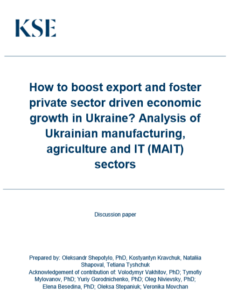- Kyiv School of Economics
- How to boost export and foster private sector driven economic growth in Ukraine? Analysis of Ukrainian manufacturing, agriculture and IT (MAIT) seсtors
How to boost export and foster private sector driven economic growth in Ukraine? Analysis of Ukrainian manufacturing, agriculture and IT (MAIT) seсtors
The present study explores the obstacles and the drivers of growth in the three most important export sectors of the Ukrainian economy – manufacturing, agriculture, and IT (collectively referred to as MAIT). The first two sectors have historically been the backbone of the country’s exports. In total, they account for 78.1% of the total value of exports, while their cumulative share of GDP is 35% (as of 2016). Although the role of IT is still smaller, it has been growing at a very fast pace. In 2016, the IT sector accounted for 2.9% of Ukraine’s exports and 2% of GDP.
The analysis illustrates clearly that the export potential of all three sectors has not been met. The number of firms per capita in Ukraine’s MAIT sectors is lower than in the corresponding EU sectors. Small and medium-sized firms are underrepresented (compared to the EU). The entry rate is low: less than 10% per year from 2013-2016. In other words, firms are not being created in sufficient enough numbers, their growth rates are subpar, and many of them continue operating even if their performance is lagging behind the market. This continuation of subpar business hinders the reallocation of resources from failing businesses to growing businesses.
The analysis yields recommendations for how to boost export and foster private sector driven economic growth. These recommendations are aimed at revitalizing firm creation and growth, increasing investment (especially FDI), and resolving existing bottlenecks that hamper firms’ growth. The recommendations emphasize the importance of policy changes aimed at resolving Ukraine’s institutional problems including strengthening of the rule of law and removal of an abuse of monopoly power. Those changes are crucial for improvement of general business environment and are prerequisites for the proper functioning of the banking system and development of capital markets (by ensuring property and creditor’s rights protection, contract enforcement, transparency in business reporting etc.).
More specific recommendations include development of programs for bank SME financing and contribution to the enhancement of infrastructure for venture financing to draw in funds and entrepreneurial expertise from developed countries, as well as development of infrastructure for payment transfers and export-oriented goods delivery.
Authors

Senior Lecturer, Aston Business School, Chief Economist, Foreign Trade Research Center Trade+

Chairman of KSE Institute, Vice President for Policy Research, Member of Advisory Board of Center of Excellence in Procurement, Member of Editorial Board of VoxUkraine, Trade +, Center of Excellence in Procurement

Ph.D. in Economics, iMoRe Project Manager and Editor

